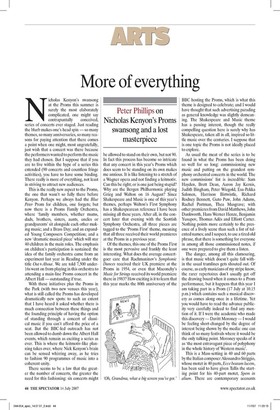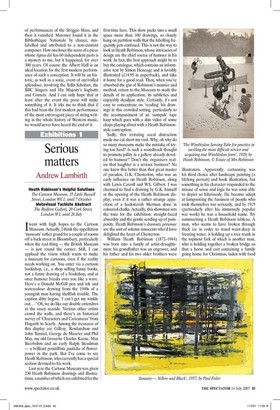More of everything
Peter Phillips on Nicholas Kenyon's Proms swansong and a lost masterpiece Nicholas Kenyon's swansong at the Proms this summer is surely the most elaborately complicated, one might say contrapuntally conceived, series of concerts ever staged. Just reading the blurb makes one's head spin — so many themes, so many anniversaries, so many reasons for paying attention that there comes a point when one might, most ungratefully, just wish that a concert was there because the performers wanted to perform the music they had chosen. But I suppose that if you are to live within the hype of a series this extended (90 concerts and countless fringe activities), you have to have some binding. There really is more of everything, not least in striving to attract new audiences.
This is the really new aspect to the Proms, the one that wasn't so fully there before Kenyon. Perhaps we always had the Blue Peter Prom for children, one forgets; but now there is a Proms Family Orchestra, where 'family members, whether mums, dads, brothers, sisters, aunts, uncles or grandparents' sit alongside each other making music; and a Brass Day; and an expanded Young Composers Competition; and a new 'dramatic musical piece' which will star 40 children in the main roles. The emphasis on children's participation is sustained: the idea of the family orchestra came from an experiment last year in Reading under the title Out +About. We are told 7,500 under16s went on from playing in this orchestra to attending a main-line Proms concert in the Albert Hall — outstanding if true.
With these initiatives plus the Proms in the Park (with two new venues this year), what is still called the Proms has developed dramatically new spots: to such an extent that I have heard it asked whether there is much connection between these things and the founding principle of having the option of standing through a concert of classical music if you can't afford the price of a seat. But the BBC-led outreach has not been allowed to dumb down the Albert Hall events, which remain as exciting a series as ever. This is where the leitmotiv-like planning takes over, where Nick Kenyon's brain can be sensed whirring away, as he tries to fashion 90 programmes of music into a coherent unity.
There seems to be a law that the greater the number of concerts, the greater the need for this fashioning: six concerts might be allowed to stand on their own, but not 90. In fact this process has become so intricate that any concert in this year's Proms which does seem to be standing on its own makes me anxious. It is like listening to a stretch of a Wagner opera and not finding a leitmotiv. Can this be right; or is one just being stupid? Why are the Bergen Philharmonic playing Grieg and Walton on 16 August? Since Shakespeare and Music is one of this year's themes, perhaps Walton's First Symphony has a Shakespearean reference I have been missing all these years. After all, in the concert later that evening with the Scottish Symphony Orchestra, all three pieces are tagged to the 'Proms First' theme, meaning that all three received their world premieres at the Proms in a previous year.
Of the themes, this one of the Proms First is the most pervasive and frankly the least interesting. What does the average concertgoer care that Rachmaninov's Symphonic Dances received their UK premiere at the Proms in 1954, or even that Maconchy's Music for Strings received its world premiere there in 1983? How exciting is it to learn that this year marks the 80th anniversary of the BBC hosting the Proms, which is what this theme is designed to celebrate; and I would have thought that such advertising parading as general knowledge was slightly demeaning. The Shakespeare and Music theme has a passing interest, though the really compelling question here is surely why has Shakespeare, taken all in all, inspired so little music over the centuries. I suppose that is one topic the Proms is not ideally placed to explore.
As usual the meat of the series is to be found in what the Proms has been doing so well for so long: commissioning new music and putting on the grandest symphony orchestral concerts in the world. The new commissions' list is incredible: Sam Hayden, Brett Dean, Aaron Jay Kernis, Judith Bingham, Peter Wiegold, Esa-Pekka Salonen, Harrison Birtwistle, Richard Rodney Bennett, Guto Puw, John Adams, Rachel Portman, Thea Musgrave; with other premieres from David Matthews, John Dankworth, Hans Werner Henze, Benjamin Yusupov, Thomas Ades and Elliott Carter. Nothing points more certainly to the presence of a lively scene than such a list of talented names; and I suspect, to use a tired old phrase, that there is something for everyone in among all those commissioned notes, if one were prepared to give them a listen.
The danger, among all this clamouring, is that music which doesn't quite fall within the usual tramlines gets shouted out. Of course, as early musicians of my stripe know, the rarer repertoires don't usually get off the drawing board when it comes to a Prom performance, but it happens that this year I am taking part in a Prom (17 July at 10.15 p.m.) which contains such a musical discovery as comes along once in a lifetime. Yet you would have to read the advance publicity very carefully indeed to find any mention of it. If I were the academic who made this discovery — Davitt Moroney — I would be feeling short-changed by the degree of interest being shown by the media: one can think of so many festivals where it would be the only talking point. Moroney speaks of it as `the most extravagant piece of polyphony in the whole history of Western music'.
This is a Mass-setting in 40 and 60 parts by the Italian composer Alessandro Striggio, whose motet in 40 parts, Ecce beatam lucem, has been said to have given Tallis the starting point for his 40-part motet, Spem in alium. There are contemporary accounts of performances of the Striggio Mass, and then it vanished. Moroney found it in the Bibliotheque Nationale by chance, mislabelled and attributed to a non-existent composer. How one loses the score of a piece whose Agnus dei has 60 independent parts is a mystery to me; but it happened, for over 300 years. Of course the Albert Hall is an ideal location for the first modern performance of such a conception. It will be an historic, as well as a sonic, event of unrivalled splendour, involving the Tallis Scholars, the BBC Singers and His Majesty's Sagbutts and Comets. And I can only hope that at least after the event the press will make something of it. It irks me to think that if this had been the first modern performance of the most extravagant piece of string writing in the whole history of Western music, we would never have heard the end of it.


















































 Previous page
Previous page